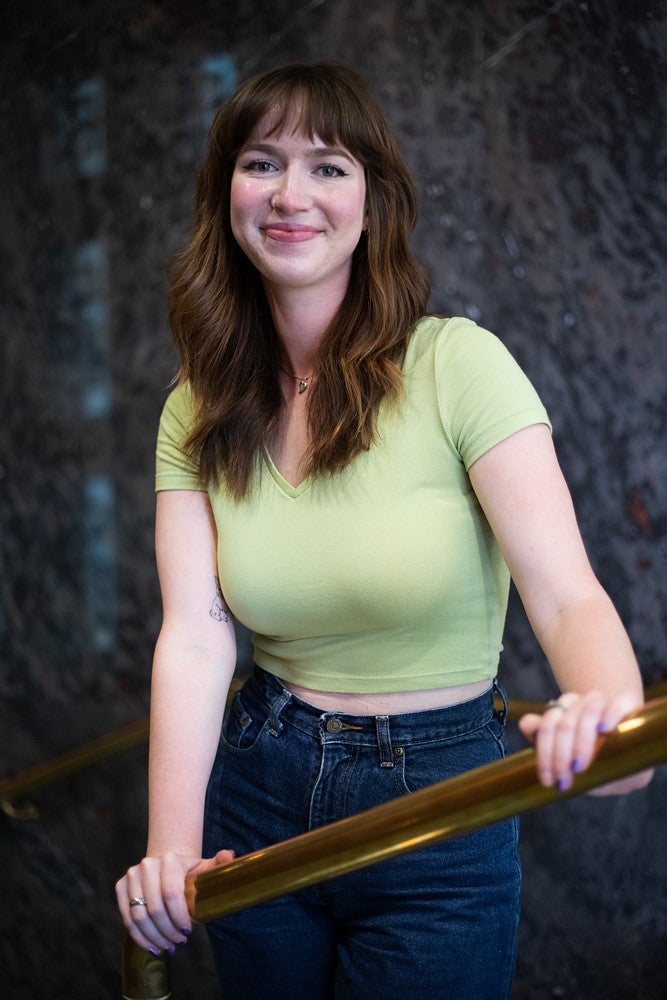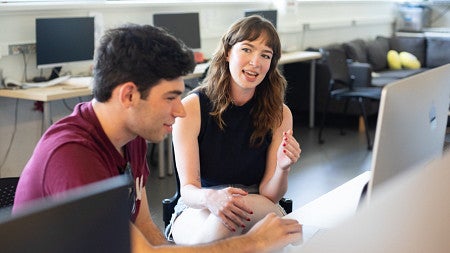Ella Hutcherson: Sharing the best stories of life

Major: Journalism
Minor: Sociology
Hometown: Coos Bay, Oregon
Why journalism: When I came to the UO, I chose journalism sort of on a whim. I really ended up enjoying the flip side of it—learning about people and learning about what makes them tick. What I think is cool about journalism is you get to deep dive into any topic you’re curious about through this lens of storytelling.
Goal: I know that I’m passionate about writing and storytelling, so I want to continue to exercise those passions for the rest of my life. As long as I’m writing and storytelling but also seeking the truth about the world, I think I’ll be happy.
Ella Hutcherson clearly remembers the sunny afternoon during her internship with the Eugene Weekly newspaper that she fell in love with journalism. Then a sophomore, she was sitting on the patio of a woman who had recently been diagnosed with bulbar-onset ALS, a terminal illness that robbed her of her ability to speak.
Hutcherson recalled the frequent moments of silence while the woman answered her questions through the use of an automated voice on her computer. “Then the voice would play, and her answers were always so poignant and stunning,” Hutcherson says now. “She spoke about all of the things she had changed about her life once she found out she didn't have all that long left to live it…figuring out how to live life to the fullest while simultaneously preparing to die.”
Hutcherson’s time in the Clark Honors College as a journalism major has been filled with opportunities for storytelling, and she has learned how to go deeper than what is often thought of as news. “It doesn’t have to be this breaking, sensational, crazy thing,” she says. “Sometimes, it’s just stories about the human condition that make others feel seen and heard and touched.”
When she first arrived at UO, Hutcherson didn’t expect to find her passion in journalism. In her first year as a writer and fact-checker at the university’s Ethos Magazine, she had to learn on the fly. Her first story, “Dance and Disability,” showed her that the process of completing a story was more difficult than she had originally thought. “I made a lot of mistakes,” she recalls.
Her story focused on DanceAbility International, a company based in Eugene that helps create an inclusive environment for dancers with disabilities. She went into her interview, conducted over Zoom, and hit an immediate obstacle that she didn’t anticipate. The interview was with a dancer with cerebral palsy and Hutcherson found it difficult to communicate.
Eventually, the dancer’s mother, who was in the room at the time, stepped in and helped facilitate the conversation. “I walked away and thought, that must have not been comfortable for her,” Hutcherson remembers. “I really wish it had not been such a delicate situation for my first interview experience, because I really don’t feel like I handled it correctly at all.”
She learned that doing thorough research on interview subjects and not walking in cold can leave you better prepared for a story.
Her mistakes, though, didn’t define her. They made her better. In her senior year, Hutcherson served as managing editor for Ethos and covered the 4J School District as a reporter for Eugene Weekly. She found that her work helped engage communities.
She also took on the challenging project of helping develop the curriculum of a new class at the School of Journalism and Communication called “Journalism and Democracy.” Under the guidance of Lori Shontz, a professor of practice, Hutcherson worked as a research assistant. The class was first taught during Winter 2023 and was a success.
Shontz says Hutcherson’s contributions included creating supplemental materials, selecting readings for the class, and reading a textbook over winter break to determine whether or not it should be used during the course. “She was able to save me and the class from some mistakes along the way as well, which was also very helpful,” Shontz says. “I don’t know that I would build another class without having (a student) involved. I mean someone’s going to have to live up to Ella, so that’s not going to be easy.”

At Ethos, Hutcherson helped writers get their stories ready for publication in the magazine. “Something I came to love about editing is how it feels like an architectural dig — it’s excavating the full potential of a story, which is always there, and just needs to be brought forth,” she says. “That’s what an editor is for.”
Maddie Ryan, a fellow senior at UO, served as Hutcherson’s editor early on at the magazine. Ryan remembers being immediately impressed with Hutcherson’s drive and excitement about being involved with something larger than herself. She recalls Hutcherson being a great team player and always open to suggestions that made her writing stronger.
“It got to a point where I felt like I was learning a lot from her, too,” Ryan says. “It was a really nice dynamic to have with somebody. She’s very thoughtful and a good writer and a great leader, and she brings people together in a really great way.”
When Hutcherson began planning for her Honors College thesis, she discovered that many of the works produced in the past by CHC journalism students analyzed journalistic pieces. She wanted her own project to be an actual piece of journalism, rather than simply an analysis.
Hutcherson’s thesis focused on how young people engage with journalism, and how their communities and identities determine what issues are most important to them.
She conducted focus groups to gather research on young people and what kinds of news are relevant to their generation. Her questions included: “Where are young people finding community and identity, and how does that inform the issues that they care about?” And “How can engaged journalism practices reconcile with the more hyper-personalized engagement patterns of Gen-Z citizens?”
She said many young people disengage from journalism in today’s oversaturated news environment, so finding methods to conduct community journalism might help draw more people in is crucial.
Hutcherson acknowledges that her time in the Honors College has provided her with critical research skills. “I don’t know if I would have the ability to research the way that I’m researching if I hadn’t been in the Honors College,” she says.
Additionally, Hutcherson finishes her schooling with an awareness that it’s essential for journalists to have a skillset outside the field. She leaves with a minor in sociology, which has been pivotal in her being able to fully understand the human condition. Simply put: It makes her stories better.
Hutcherson anticipates a future within the journalism field and looks forward to being able to continue to tell stories for years to come. “It’s just a journey where, as I learn more, I become more entrenched in journalism and therefore more in love with the work,” she says.
- Story by Mirandah Davis-Powell, Clark Honors College Communications
- Photos by Ilka Sankari, Clark Honors College Communications
